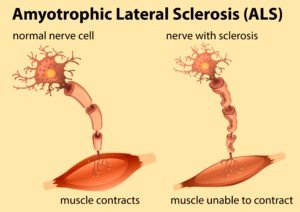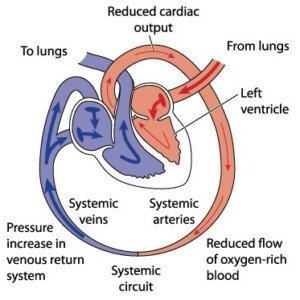
If you’ve been suffering from worsening fatigue, congestive heart failure may come to mind, but ALS can also cause this.
Is there a difference between early stages of ALS fatigue and that of mild congestive (now known as “chronic”) heart failure?
Chronic heart failure is when the ability of the heart to pump an adequate supply of blood with each beat is compromised.
There may or may not be an issue of congestion causing fluid retention.
Systolic heart failure is when an insufficient volume of blood gets pumped with each beat due to weak cardiac muscle, though the chambers of the heart fill with an adequate supply of blood to be pumped.
Diastolic heart failure is when the pumping action is adequate, but not enough blood fills the chambers to be pumped out with each beat.
ALS is a motor neuron disease in which the nerves fail to properly conduct electrical impulses to contract muscle fibers.
This problem originates in the spinal cord, brain stem and brain where neurons start dying.

As a result, muscle tissue—because it never receives instructions to contract from the dead nerve cells—begins wasting away.
Chronic congestive heart failure and ALS cause fatigue.
But is the fatigue from one different from the other? At least in the early stages of ALS vs. mild heart failure?
As ALS progresses, other symptoms come into play that don’t fit the bill for a cardiac problem.
And as chronic heart failure progresses, this too brings forth symptoms that are not present with ALS at any stage.
Symptoms of Class II and III Chronic Heart Failure
- Comfortable at rest, but normal physical activity may cause fatigue and shortness of breath (II) or with III, you’re still okay at rest, but there’s an obvious limitation with even mild exercise: fatigue and shortness of breath.
- Fatigue is actually one of the first-noticed symptoms.
- Along with that fatigue in early CHF may also be edema (swelling) in the ankles, and weight gain from fluid retention.
As congestive heart failure progresses, you’ll probably also experience a cough from fluid buildup in the lungs, wheezing and a shortness of breath that’s not only from impaired pumping action of the heart, but fluid buildup (edema) in the lungs.
This will cause an increasing intolerance to exercise or physical activity.
As CHF progresses, the patient will experience shortness of breath at rest—and in fact, may need supplemental oxygen for sleep.
The CHF patient does not have a mechanical problem with breathing; their ability to inhale works just fine.
The issue is inadequate blood circulation and edema in the lungs. In fact, they may have no problem whatsoever taking deep breaths.
“Shortness of breath” is not the same as difficulty inhaling.
“Shortness of breath” is what one feels when there’s not enough oxygen circulating in their body—as in a healthy person who just sprinted across a parking lot, or a person with CHF who just walked up a short flight of stairs.
“Muscular weakness is a prominent feature with ALS, and exercise intolerance is a hallmark of heart failure,” says Roger Mills, MD, cardiologist and former professor of medicine, University of Florida, and author of “240 Beats per Minute. Life with an Unruly Heart.”
“However, the weakness of ALS is more or less constant and slowly progressive.
“Early on, heart failure patients are not so much weak as [they are] exercise intolerant.
“The ALS patient can’t go up stairs because he/she does not have the leg strength to lift his/her body.
“The heart failure patient can’t make it all the way up because he/she becomes short of breath after five or six steps.”
The collection of CHF symptoms are hard to dismiss as the disease progresses. These include loss of appetite, fluid retention and nausea.
A unique characteristic of CHF is that, due to the impaired pumping action of the heart, blood is diverted away from the arms and legs (less critical areas), to supply the brain and heart.

Heart Failure. Shutterstock/Blamb
Patients thus often feel weakness or fatigue in their legs and arms. This will affect the activities of daily living.
Meanwhile, again, they have no trouble breathing, but often FEEL short of breath.
As for the actual ability to walk up a flight of stairs, let alone hop up the steps, “It depends on how far ALS has progressed,” says Mitzi J. Williams, MD, clinical neurologist with Morehouse School of Medicine and clinical advisor for the Multiple Sclerosis Foundation.
“In early stages, someone may be able to hop up the stairs,” says Dr. Williams.
“If weakness and fasciculations progress, this will no longer become possible. The symptoms only continue to progress — so the symptom will not improve once they can no longer hop up the stairs.”
As chronic heart failure worsens, the patient will still be able to climb a staircase with normal ambulation – with no impairment in the operation of their neuromuscular system.
However, there may be pauses every few steps as they catch their breath.
Symptoms of Early ALS
- Difficulty walking, which may include stumbling
- Weakness in the legs
- At this point, the arms may feel fine (whereas in CHF, all four limbs are simultaneously affected due to blood-supply diversion)
- Cramping muscles
- Twitching muscles
- Slurred speech
- Trouble swallowing
If someone with ALS has at least one other symptom besides fatigue or weakness, this will point away from congestive or chronic heart failure.
For instance, CHF doesn’t cause slurred speech or tripping due to lack of coordination.
ALS typically starts in one part of the body, then spreads, whereas the weakness and fatigue of congestive (or chronic) heart failure is global since it’s caused by inadequate blood supply.
As ALS progresses, respiratory function becomes impaired. Breathing is controlled by muscles.
Because motor impulses are not reaching these muscles, the patient begins experiencing difficulty with the mechanics of breathing. But by then, they will have already been diagnosed.
As both congestive heart failure and ALS progress, the disparity in their symptom profiles increases, though they often just begin with weakness and/or fatigue.
The element of weakness, rather than fatigue, is more pronounced in early ALS; and the element of fatigue, rather than weakness, is more prominent in mild congestive heart failure.

Dr. Williams is author of “MS Made Simple: The Essential Guide to Understanding Your Multiple Sclerosis Diagnosis.” She is a member of the American Academy of Neurology.










































